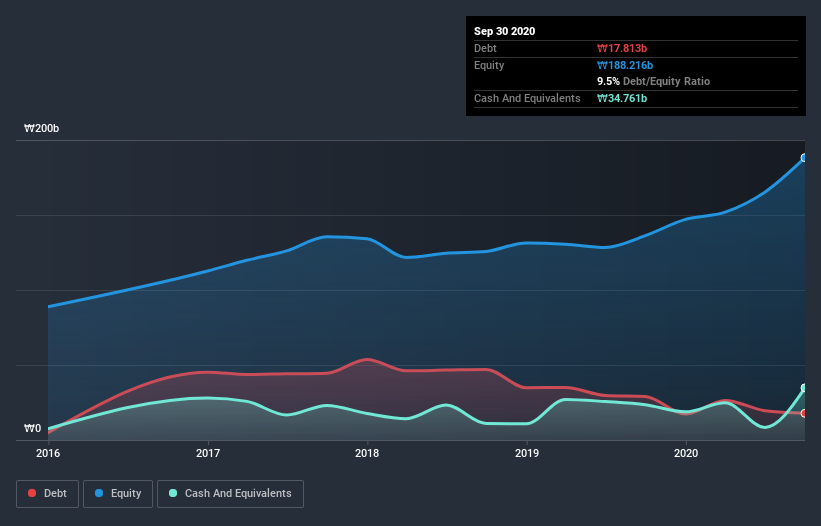Legendary fund manager Li Lu (who Charlie Munger backed) once said, 'The biggest investment risk is not the volatility of prices, but whether you will suffer a permanent loss of capital.' So it seems the smart money knows that debt - which is usually involved in bankruptcies - is a very important factor, when you assess how risky a company is. As with many other companies ICD Co., Ltd. (KOSDAQ:040910) makes use of debt. But is this debt a concern to shareholders?
Why Does Debt Bring Risk?
Debt is a tool to help businesses grow, but if a business is incapable of paying off its lenders, then it exists at their mercy. Part and parcel of capitalism is the process of 'creative destruction' where failed businesses are mercilessly liquidated by their bankers. However, a more usual (but still expensive) situation is where a company must dilute shareholders at a cheap share price simply to get debt under control. Of course, plenty of companies use debt to fund growth, without any negative consequences. When we think about a company's use of debt, we first look at cash and debt together.
See our latest analysis for ICD
What Is ICD's Debt?
The image below, which you can click on for greater detail, shows that ICD had debt of ₩17.8b at the end of September 2020, a reduction from ₩29.1b over a year. However, its balance sheet shows it holds ₩34.8b in cash, so it actually has ₩16.9b net cash.

A Look At ICD's Liabilities
We can see from the most recent balance sheet that ICD had liabilities of ₩52.6b falling due within a year, and liabilities of ₩10.7b due beyond that. Offsetting these obligations, it had cash of ₩34.8b as well as receivables valued at ₩60.9b due within 12 months. So it can boast ₩32.5b more liquid assets than total liabilities.
This short term liquidity is a sign that ICD could probably pay off its debt with ease, as its balance sheet is far from stretched. Simply put, the fact that ICD has more cash than debt is arguably a good indication that it can manage its debt safely.
Even more impressive was the fact that ICD grew its EBIT by 242% over twelve months. If maintained that growth will make the debt even more manageable in the years ahead. When analysing debt levels, the balance sheet is the obvious place to start. But it is future earnings, more than anything, that will determine ICD's ability to maintain a healthy balance sheet going forward. So if you want to see what the professionals think, you might find this free report on analyst profit forecasts to be interesting.
Finally, a company can only pay off debt with cold hard cash, not accounting profits. While ICD has net cash on its balance sheet, it's still worth taking a look at its ability to convert earnings before interest and tax (EBIT) to free cash flow, to help us understand how quickly it is building (or eroding) that cash balance. Looking at the most recent three years, ICD recorded free cash flow of 43% of its EBIT, which is weaker than we'd expect. That weak cash conversion makes it more difficult to handle indebtedness.
Summing up
While it is always sensible to investigate a company's debt, in this case ICD has ₩16.9b in net cash and a decent-looking balance sheet. And it impressed us with its EBIT growth of 242% over the last year. So we don't think ICD's use of debt is risky. There's no doubt that we learn most about debt from the balance sheet. But ultimately, every company can contain risks that exist outside of the balance sheet. To that end, you should be aware of the 2 warning signs we've spotted with ICD .
When all is said and done, sometimes its easier to focus on companies that don't even need debt. Readers can access a list of growth stocks with zero net debt 100% free, right now.
When trading ICD or any other investment, use the platform considered by many to be the Professional's Gateway to the Worlds Market, Interactive Brokers. You get the lowest-cost* trading on stocks, options, futures, forex, bonds and funds worldwide from a single integrated account. Promoted
New: AI Stock Screener & Alerts
Our new AI Stock Screener scans the market every day to uncover opportunities.
• Dividend Powerhouses (3%+ Yield)
• Undervalued Small Caps with Insider Buying
• High growth Tech and AI Companies
Or build your own from over 50 metrics.
This article by Simply Wall St is general in nature. It does not constitute a recommendation to buy or sell any stock, and does not take account of your objectives, or your financial situation. We aim to bring you long-term focused analysis driven by fundamental data. Note that our analysis may not factor in the latest price-sensitive company announcements or qualitative material. Simply Wall St has no position in any stocks mentioned.
*Interactive Brokers Rated Lowest Cost Broker by StockBrokers.com Annual Online Review 2020
Have feedback on this article? Concerned about the content? Get in touch with us directly. Alternatively, email editorial-team@simplywallst.com.
About KOSDAQ:A040910
ICD
Engages in the manufacture and sale of AMOLED, LCD, and semiconductor equipment in South Korea and internationally.
Good value with adequate balance sheet.
Market Insights
Community Narratives



